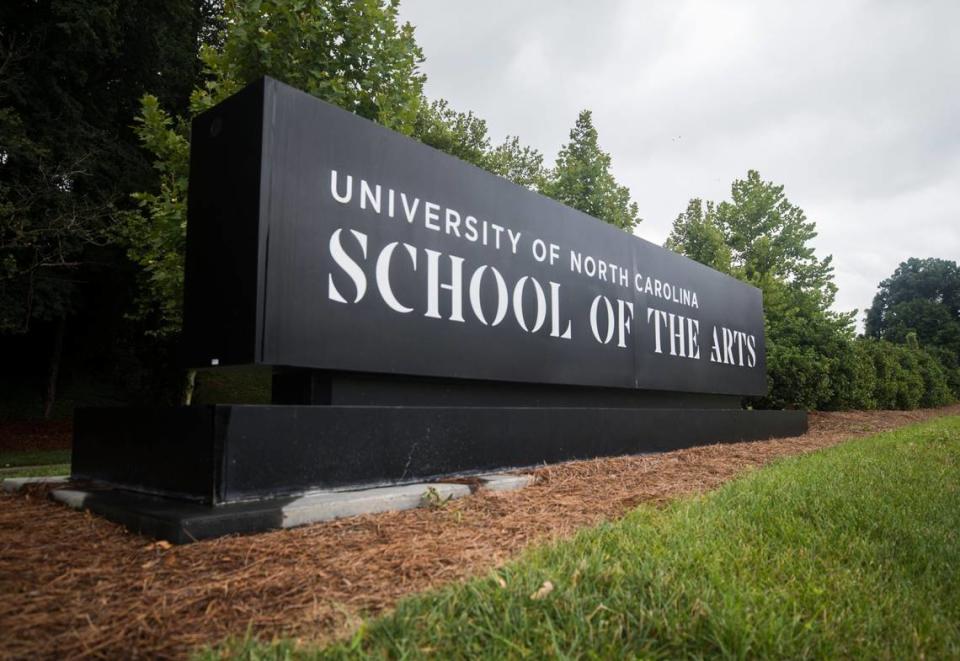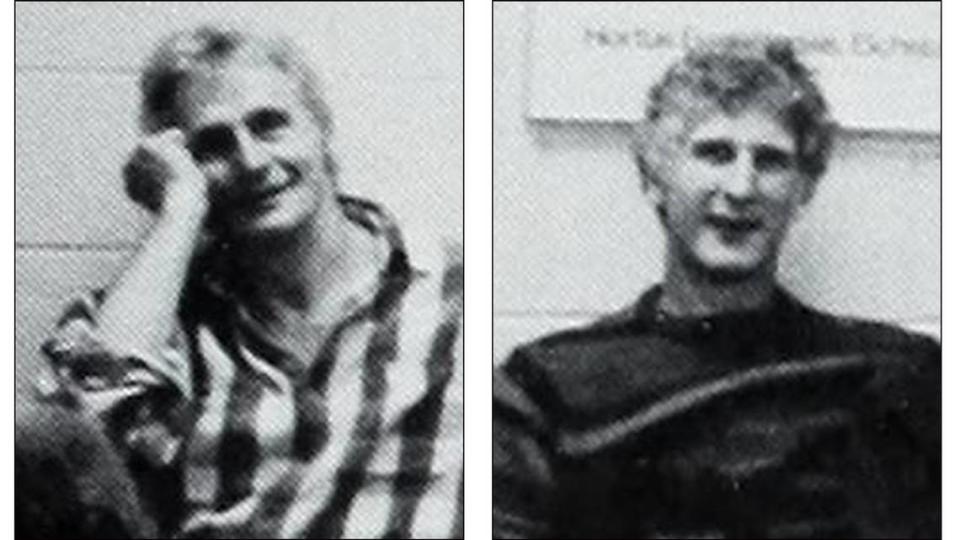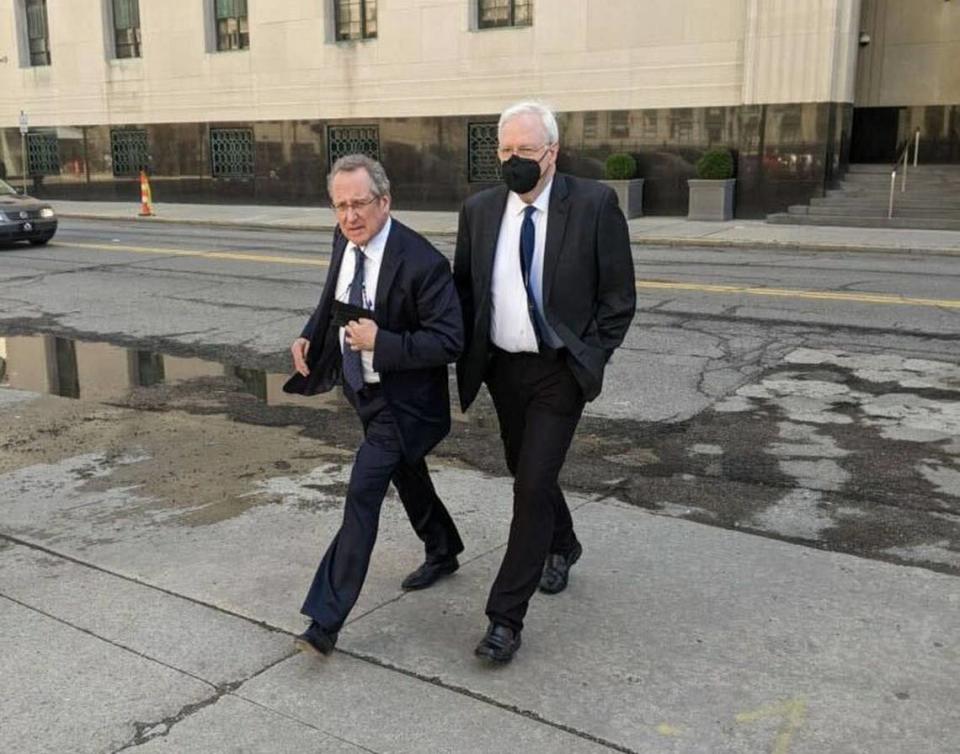Editor’s note: This story repeats details of sexual assault allegations, which will be disturbing to some readers.
The University of North Carolina School of the Arts has settled a lawsuit with dozens of alumni accusing former officials there of allowing faculty to sexually abuse, harass and exploit students at the prestigious arts school.
The University of North Carolina System and the School of the Arts agreed to pay about 65 alumni a total of $12.5 million over four years. The UNC System will cover $10 million of the settlement, with the school paying the rest. The money will be divided among the alumni, based on factors such as the nature and duration of the abuse, said an attorney representing the alumni.
“This has without a doubt been a dark time for UNCSA,” Chancellor Brian Cole said in a statement
“We honor the courage it took for these alumni to share their experiences,” Cole said, “and commit to doing all that we can to continually bolster an environment of safety and trust at UNCSA.”
The lawsuit says teachers sexually abused and exploited students as administrators turned “a willful blind eye” to egregious and outrageous conduct during most of the school’s history from the 1960s to the 2010s.
During that time, some teachers invited students to their homes and served them them alcohol. Some developed what they portrayed as sexual relationships, but that actually was sexual abuse that left students confused and traumatized for years, according to the lawsuit.
Students as young as 12 who boarded at the elite Winston-Salem campus navigated grooming and sexual attention from teachers and mentors. Abusers often held power over the students, with the ability to decide who could remain in their programs and enable them become musicians, dancers and filmmakers through connections and attention.
“Despite the clear obligation to the boys and girls who chose to attend the school, the Defendant Administrators instead permitted, participated in, encouraged, allowed, perpetuated and/or condoned a culture of sexual abuse and exploitation,” the lawsuit states.
The inaction potentially harmed hundreds of students who attended UNCSA and students at other schools who were harmed by teachers who quietly left campus, the lawsuit states.
“Though this resolution cannot heal the wounds of the past, it is my deep hope that through it, the survivors who came forward feel our commitment to listening, acknowledging and doing right by them,” Cole said.
The UNC School of the Arts does enormous good for the state, UNC System president Peter Hans said in a statement.
“The commitment to acknowledge and make amends for past failings is exactly what we should want from our public institutions,” Hans said.
From seven accusers to 65
The lawsuit was initially filed in September 2021 by seven alumni who were enrolled in dance at the school in the 1980s at the UNC System arts campus. The plaintiffs were represented by Gloria Allred, a California-based attorney nationally known for representing abuse survivors, and North Carolina’s Lanier Law Group.
Over time, more plaintiffs came forward with accounts of abuse by staff who were added as defendants. The defendants include about 20 mostly former employees, some of whom have died.
UNCSA opened in 1965 as the nation’s first public arts conservatory, housing both high school and university students on a 75-acre campus in Winston Salem. It remains one of the country’s top arts campuses.
Some teachers regularly touched students’ breasts, buttocks and groins to push them into straighter posture or higher leaps, the lawsuit says. Through plaintiffs’ stories, the lawsuit outlines multiple instances of different teachers touching students sexually, attempting to, or having sex with them.
That includes Richard Kuch and Richard Gain, dance faculty who invited underage students off-campus and sexually assaulted them, in one case leaving a student with bruises and bite marks on his chest.
“This resolution marks the end of a decades-long journey for these former UNCSA students,” said Lisa Lanier, an attorney for the alumni.

Previous allegations
The school faced similar allegations in the 1990s.
One of the plaintiffs in the current lawsuit, Christopher Soderlund, filed a lawsuit on his own in 1995, which brought widespread criticism upon UNCSA.
Soderlund said Kuch and Gain sexually abused him after he enrolled in 1983 at the age of 15.
The teachers groomed him until, in 1984, Gain took Soderlund to the Yadkin County farmhouse he shared with Kuch, plied him with alcohol and had sex with him, Soderlund’s lawsuit said.
It was the first of several sexual assaults, according to the lawsuit, which Soderlund endured out of fear that he would lose his position at the school and other potential support from the men.
Their relationship was common knowledge on the college, but no one intervened, according to the lawsuit.
Soderlund complained to ballet teacher Duncan Noble, who said that he too would have liked to have sex with Soderlund, he claimed in his lawsuit.
Kuch and Gain resigned before they faced a disciplinary hearing or the result of a special commission created by the UNC Board of Governors the same year the lawsuit was filed to study UNCSA’s culture.
Kuch and Gain denied the allegations in a legal filing.

Legal challenges
A judge dismissed Soderland’s 1995 lawsuit because he was older than 21, the state’s statue of limitations for child sex abuse lawsuits at that time.
A change in legislation, however, allowed for former UNCSA students to sue, but the law may not hold up to legal scrutiny.
In October 2019, state legislators passed the SAFE Child Act, which temporarily paused the statute of limitations in child sex abuse lawsuits from January 2020 to December 2021.
UNCSA commission
The 1995 commission asked students and alumni to report abuse, but never publicly named the accused faculty.
After the investigation, the commission denied a pervasive pattern of improper sexual conduct between faculty and students.
“However, there is evidence that a few employees at various times, especially during the decade of 1980, did engage in conduct which is not tolerable and which must not be allowed to occur in the future,” the commission’s final report said.
Following the commission’s recommendations, the school forbid all relationships between teachers and students, and pledged to protect students from retaliation after they reported abuse.
The commission’s findings incorrectly said that most of the alleged perpetrators had left the school.
Interviews with former members of the school community along with unpublished documents revealed that 24 members of the staff were accused of harassing or having relationships with students, a News & Observer and Charlotte Observer investigation found.
Of the 13 who were still working with the school in 1995, at least 12 stayed several years after the investigation, the reporting showed. Five were still listed on the school’s roster in October 2021. Five accused faculty told the newspapers they were never told of accusations against them or given a chance to respond.
Documents also indicate the commission was originally tasked with referring some accusations to university officials or legal authorities, but public records show no evidence they did so.

Former teacher convicted
In the lawsuit, former UNCSA students also accused Stephen Shipps of sexual exploitation.
Shipps taught at the UNCSA, but took a position at the University of Michigan in 1989. His behavior while employed there resulted in federal criminal charges.
A former student told investigators that Shipps, while employed at Michigan, had twice taken her to New York and sexually abused her in 2002, when she was 16 years old.
In April 2022, a federal judge sentenced Shipps to five years in prison after he pleaded guilty to one of the counts of trafficking a minor for sex.
Three women who studied under Shipps in North Carolina say he molested them on campus and at his home when they were teens, The Observer and The N&O reported.
Virginia Bridges covers criminal justice in the Triangle and across North Carolina for The News & Observer. Her work is produced with financial support from the nonprofit The Just Trust. The N&O maintains full editorial control of its journalism.

